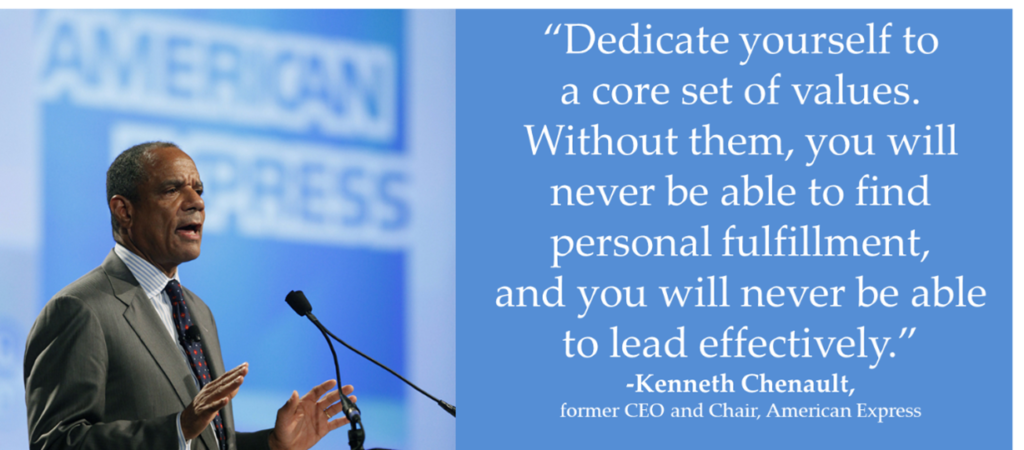Article Summary:
Many of us get into trouble when we start living and leading in ways that conflict with our values. That usually starts with not knowing what our core values are.
+++
Our values are what’s most important to us. What we believe and stand for. Our convictions about what’s most important in life.
“Your core values are the deeply held beliefs that authentically describe your soul.”
-John C. Maxwell
Many of us get into trouble when we start living and leading in ways that conflict with our values. First, we must know what our core values are.
The Costs of Lacking Clarity on Our Values
Lacking clarity about our core values can get us into trouble in many areas.
For example, lacking clarity about our core values makes it harder to:
- be decisive and make decisions, including good decisions about career and work
- determine our top priorities
- be assertive about what we stand for
- maintain clarity and poise during challenges
- identify misalignments in our lives (such as when we’re overinvesting in our work and underinvesting in our relationships)
- discover our purpose
- bring more meaning and significance into our lives
“Perhaps the most significant thing a person can know about himself
is to understand his own system of values.
Almost every thing we do is a reflection
of our own personal value system.”
-Jacques Fresco
Lacking clarity about our values reduces or weakens our:
- character
- confidence
- motivation
- willpower to persist through challenges
- stress resilience
- satisfaction at work
- performance at work
- leadership effectiveness
It also makes it easier for:
-
- us to lose focus on things that matter most
- our negative self-talk to hijack our inner dialogue
- us to make poor choices in choosing a life partner (due to a major values misalignment)
Lacking clarity about our values makes it less likely that we’ll:
-
- be fully authentic
- make needed improvements in our lives (e.g., healthier eating or more exercise)
- move forward in realizing our potential
- maintain our happiness and quality of life
Finally, it makes it more likely that we’ll:
- make big mistakes that lead to major regrets
- do something unethical and illegal, perhaps damaging our reputation and career

Take the Traps Test
We all fall into traps in life. Sometimes we’re not even aware of it, and we can’t get out of traps we don’t know we’re in. Evaluate yourself with our Traps Test.
The Benefits of Knowing Our Values
Naturally, there’s a flipside to all the costs listed above. There are many powerful benefits that come from knowing our values.
A big one is that our core values, along with our purpose, can serve as a sort of safe harbor in our lives—a place to return to amidst the storms and chaos.
“A highly developed values system is like a compass.
It serves as a guide to point you in
the right direction when you are lost.”
-Idowu Koyenika
Our values can help us continue living in integrity even when times are tough, providing an important source of comfort and solace.
Our core values can also serve as a catalyst of motivation, keeping us inspired and moving forward in a state of empowerment. They can point us toward an exciting vision that resonates with who we are and what we want at the core.
Finally, according to University of Pennsylvania researchers, encouraging new workers to express their personal values at work was linked to them significantly outperforming peers, being more satisfied at work, and higher retention.
The benefits are truly compelling.

(For guidance on how to discover your values, see my related article, “How to Discover Your Core Values.”)

Personal Values Exercise
Complete this exercise to identify your personal values. It will help you develop self-awareness, including clarity about what’s most important to you in life and work, and serve as a safe harbor for you to return to when things are tough.
Conclusion
Discovering our core values and living by them can improve all dimensions of our life and work.
The key, of course, is not just knowing our core values or writing them down.
The key is living them—building them into the fabric of our lives. Using them to guide our decisions, actions, priorities, and allocation of time and energy—and as a guide to crafting a good life.
Reflection Questions
- Do you know your core values?
- To what extent are you honoring and upholding them lately?
- What more could you do to clarify or re-examine your values and integrate them into your life and work?
Tools for You
- Personal Values Exercise to help you clarify what’s most important to you
- Traps Test (Common Traps of Living) to help you identify what’s getting in the way of your happiness and quality of life
- Quality of Life Assessment to help you discover your strongest areas and the areas that need work and then act accordingly
Postscript: Inspirations on Values
- “When making a decision, big or small, choose in favor of your values. Your values will always point you to the life that holds the most meaning and happiness.” -Rob Kaiser
- “Focus not on doing less or doing more, but on doing what you value.” -Gretchen Rubin
- “Life is good when you live from your roots. Your values are a critical source of energy, enthusiasm, and direction. Work is meaningful and fun when it’s an expression of your true core.” -Shoshana Zuboff
- “Core values serve as a lighthouse when the fog of life seems to leave you wandering in circles.” -J. Loren Norris
- “Personal leadership is the process of keeping your vision and values before you and aligning your life to be congruent with them.” -Stephen R. Covey
- “A clear purpose will unite you as you move forward, values will guide your behavior, and goals will focus your energy.” -Ken Blanchard
- “When values, thoughts, feelings, and actions are in alignment, a person becomes focused and character is strengthened.” -John C. Maxwell
- “The more that we choose our goals based on our values and principles, the more we enter into a positive cycle of energy, success, and satisfaction.” -Neil Farber
Sources
- Creswell, J.D. et al., “Affirmation of personal values buffers neuroendocrine and psychological stress responses,” Psychological Science. 2005 Nov; 16 (11): 846-51.
- Daniel M. Cable, Francesca Gino, and Bradley R. Staats, “Breaking them in or eliciting their best? Reframing socialization around newcomers’ authentic self-expression,” Administrative Science Quarterly, Volume 58, Number 1, pp. 1–36, February 8, 2013.
- Hitlin, S. (2003). Values as the core of personal identity: Drawing links between two theories of self. Social Psychology Quarterly, 66(2), 118.
- Schwartz, S. H. (1994). Are there universal aspects in the structure and contents of human values? Journal of Social Issues, 50(4), 19–45.
- Schwartz, S. H., & Bilsky, W. (1987). Toward a universal psychological structure of human values. Journal of Personality and Social Psychology, 53(3), 550–562.
- Meg Selig, “9 Surprising Superpowers of Knowing Your Core Values,” Psychology Today, November 27, 2018.

Gregg Vanourek’s Newsletter
Join our rapidly growing community. Sign up now and get monthly inspirations (new articles, opportunities, and resources). Welcome!
+++++++++++++++++
Gregg Vanourek is a writer, teacher, and TEDx speaker on leadership and personal development. He is co-author of three books, including LIFE Entrepreneurs: Ordinary People Creating Extraordinary Lives (a manifesto for integrating our life and work with purpose, passion, and contribution) and Triple Crown Leadership: Building Excellent, Ethical, and Enduring Organizations (a winner of the International Book Awards). Check out his Best Articles or get his monthly newsletter. If you found value in this article, please forward it to a friend. Every little bit helps!

